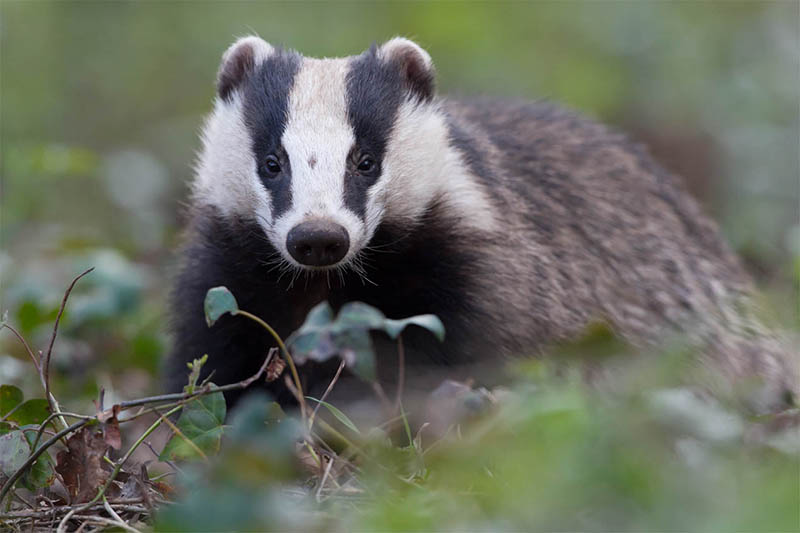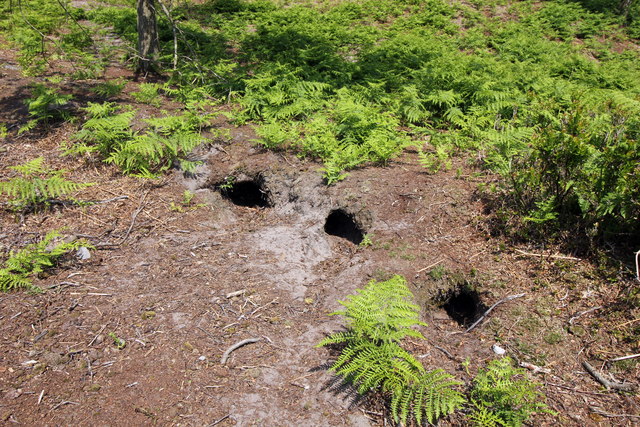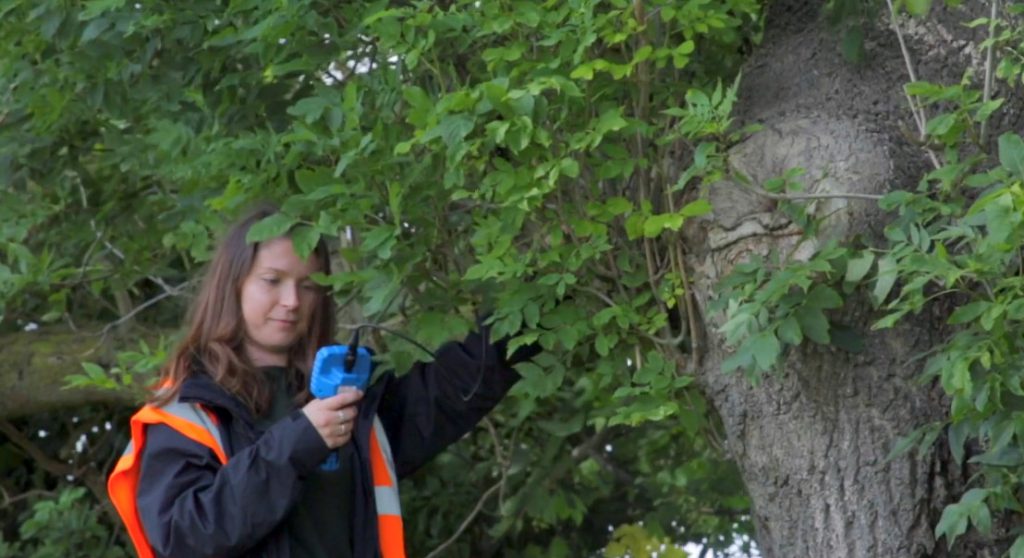Everything You Need to Know About Badger Surveys

Widespread throughout the UK and mostly common in southern England, badger population numbers range somewhere between 250,000 and 400,000. Badgers are nocturnal animals, spending the majority of their time in badger setts underground. A badger sett is a network of tunnels below the surface of the ground that are used as dens and can be navigated by badgers digging through them using their strong claws and upper body strength.
Often living in family groups, they are social animals, with typically around five badgers per sett. Although badgers do not hibernate, they are far less active in the winter months and use fat reserves for energy that they accumulate in late summer and autumn. In addition, badgers are notably elusive and most people would be unlikely to ever see one in the wild.
Badgers (meles meles) belong to the family of mammals known as Mustelidae alongside otters, weasels and wolverines. Protected species of animals and plants in England and Wales are safeguarded by the Wildlife and Countryside Act 1981 and the Conservation of Habitats and Species Regulations 2017. Badgers are also included within schedule 6 of the Wildlife and Countryside Act 1981, as well as the Protection of Badgers Act 1992 – a piece of legislation designed to directly guarantee the safety of badgers situated throughout the country.
Under the Protection of Badgers Act, it is illegal to wilfully kill, injure, possess or mistreat a badger, possess a dead badger or any part of a badger, or damage, destroy, obstruct or disturb a badger sett. Anyone found guilty of these offences could potentially face a maximum fine of £5,000 and/or a six-month custodial sentence.
Due to their protected status, a mitigation plan to demonstrate to the planning department of your local council how you would reduce damage and compensate for any adverse effects to the badgers and their setts is required. Without a suitable plan for avoiding damage to badger habitats, developers run the risk of prosecution and refused planning permission.
Badger Surveys
The badger survey process usually consists of two different types of assessment: the phase 1 survey and the phase 2 survey.
Depending on the circumstances such as the nature of the planning project and findings from the phase 1 and phase 2 assessments, further surveys may be required, such as a badger bait marking survey. If other protected species of animal or plant are found, we can also integrate a new survey into the assessment process to cater to your needs.
Below, you will find an explanation of how surveying for badgers is undertaken during the course of the phase 1 and phase 2 badger survey:
Badger Surveying
Phase 1 Survey
Otherwise known as a scoping badger survey or a walkover badger survey, the phase 1 survey acts as the first stage in the assessment process. It will involve an ecologist inspecting all areas of the proposed development site for indications of badger occupancy such as badger sett entrance holes, carcasses, foraging pits, badger hairs, communal latrines, badger paw prints, scratch marks, snuffle holes, spoil heaps, well worn paths and any other signs that could point towards the territorial boundaries of badger social groups.
A Preliminary Ecological Appraisal (PEA) is a baseline assessment that aims to uncover all animal and plant species in order to confirm or deny the need for further ecology surveys on the site. As such, a phase 1 badger survey will often be conducted as part of a Preliminary Ecological Appraisal.
If the walkover survey confirms the presence of badgers, or if evidence suggests even a miniscule likelihood of badgers on or in the nearby vicinity of the development site, a phase 2 survey may be requested by the local planning authority.
Phase 2 Survey
Also known as a badger activity survey, the phase 2 survey is triggered any time a phase 1 survey has indicated badger occupancy or a badger sett on the development site. After establishing a high likelihood that badgers live on the site in phase 1, phase 2 will act as a method of gauging the extent of present badger social groups and gather more information about them.
Sharing similarities to other activity surveys such as a Bat Emergence and Re-Entry Survey, an activity survey on badgers will involve multiple visits to the site at sunrise and sunset. In these visits, ecological consultants will fix infrared cameras on badger sett entrances as camera traps to take pictures and record video of a badger clan’s territory. Other techniques may also be used, such as placing sticky tape around badger sett entrances or a spoil heap to collect badger hairs, confirming the presence of badgers.
Through monitoring badger sett entrances, the ecological surveyors can determine population sizes, and if there are a number of active setts, all of them can be tracked, from the main setts to new setts, and even including any alternative sett, outlier sett, or artificial badger setts in the development works area. As well as confirming that badgers are on the development site, it will also confirm if they aren’t, giving local authorities trustworthy evidence that the development work will not disturb a badger whilst it uses a sett on the site.
Badger Survey Methodology
Providing a high quality service to all private and professional clients is something that Arbtech has held as a fundamental aim since day one.
A number of factors play a role in achieving this goal, including an effort to balance our own knowledgeable, insightful and expert approach alongside the guidance of trusted regulators and organisations.
Badger Survey Guidelines
Operating under relevant best practice guidelines places assurances over the standard of our survey services, promoting the utmost accuracy and effect. Corresponding laws across England and Wales naturally contribute to our approach to assessments, with badger surveys influenced by the Protection of Badgers Act 1992 and the broader Wildlife and Countryside Act 1981.
Looking specifically at the Protection of Badgers Act, badgers are fully protected from being taken, injured or killed, or facing any form of cruelty. The Act also prohibits interference with badger setts, the possession or selling of live badgers, and ringing, marking or tagging badgers.
Across all teams, we strive to remain in touch with the latest updates, including in regards to badgers, badger ecology and the environmental management and mitigation strategies relating to them. Regulators and organisations that assist us with information and guidance include Natural England / Natural Resources Wales and the Chartered Institute of Ecology and Environmental Management (CIEEM).
Badger Survey Techniques
A variety of different techniques are used for each type of badger survey. In a phase 1 survey, the ecologist will inspect the development site at length for signs that could indicate badgers, particularly suggesting occupancy if a badger sett is found.
A phase 2 survey will require more time, visits and ecological consultants than a phase 1 survey. It will also require specialised equipment, using advanced cameras to capture images and videos of badgers on the site.
A badger bait marking survey, however, will take a more specialised approach. Ecological surveyors will leave indigestible plastic pellets outside of each identified badger sett on the site. Usually coated in golden syrup and peanuts to make them more desirable to inhabiting badgers, the plastic pellets will then be eaten by nearby badgers and collected from the badger’s droppings.
Badgers mark their territory by defecating in communal latrines known as dung pits. Coloured pellets will be used, with different colour plastic pellets left outside each badger sett, allowing the ecologist to gauge whether all badgers belong to the main badger sett and the same social group based on the colours of indigestible plastic pellets collected from the badger droppings in separate dung pits.
Equipment Used in a Badger Survey
As with the majority of protected species surveys, a phase 1 badger survey will require simple items such as paper, a pen, a clipboard and access to a grid reference finder or what3words to mark key areas of the development site where badger holes are identified.
In terms of the phase 2 survey, highly-specialised survey equipment is needed to monitor and record badgers on the development site. We invest in the best technology on the market, recording badger activity using motion-triggered, infrared cameras that capture video and still images of activity.
Cameras are commonly set up near each known suspected badger sett and left for four weeks, collecting data once a week. If it is ineffective based on the layout of the site, however, a stick and sand trap will be made, layering sand outside the badger sett entrance hole and placing a lightweight stick in the hole to monitor activity every other day for four weeks.
Below is an example of footage captured using infrared cameras at a main sett during one of our badger surveys:
Among the equipment we use is a rig we originally set up for use in bat surveys. Now used as a badger camera, it captures great shots like the one above from an assessment in Cheam, Surrey. This method has the advantage of giving you peace of mind that, if you do have to spend a little extra money to protect or move badgers, at least you have evidential confirmation that badgers are present before investing time and money into mitigation.
Another benefit from an infrared camera such as the one above is that you will know the exact population sizes and numbers of badgers occupying a sett or a number of setts, making the mitigation licence application significantly easier.
From experience, we would even go as far as saying that you should be able to use this method if you need to survey for badgers outside of the normal season because – despite vegetation growth camouflaging their field signs – the cameras will still be able to confirm or deny badger occupancy.
Badger Survey Season
Across all assessments, badger survey timing differs based on species behaviour and other variables such as vegetation growth.
For a phase 1 badger survey, the ecological consultant can undertake the assessment at any time of year. The best seasons, however, are February to April and September to November due to badger activity and vegetation growth less likely to disrupt field signs.
As the phase 2 badger survey is designed to monitor activity, the same timescales are recommended. Likewise, the optimal times also apply to other surveys on sites used by badgers, such as badger bait marking surveys. That said, early spring is often a desirable time for a badger survey, particularly as badgers are active and vegetation is low.
Badger Surveys and Mitigation
Rather than carelessly disregarding present species under legal protection and negatively impacting a potential badger sett on your development site, developers are encouraged to take the necessary first step to prevent harm to badger habitats.
It is also worth noting that refusing to show consideration to nearby badgers won’t bode well with the local planning authority, likely resulting in your application for planning permission being refused.
Examples of simple solutions that could avoid harm coming to badgers include avoiding the use of artificial lighting, prohibiting loud noises and vibrations near badger setts, and keeping heavy machinery, fire and chemicals at a safe distance away from badger setts.
Bat Survey Licence
If disruption to badgers is entirely unavoidable, a licence to disturb and/or destroy badger setts on your development site will be needed from Natural England / Natural Resources Wales. Often issued outside of badger breeding season between the months of July and November, a badger licence allows the required mitigation to be carried out and the development works that would otherwise be against the law to continue as planned, even with badgers present.
For instance, appropriate mitigation using a badger licence could include moving badgers elsewhere on or off the site, excluding badgers from a specific badger sett, and constructing an artificial sett in a chosen location; artificial setts are often used as a suitable habitat replacement. Ideally, foraging areas would be retained, but if it isn’t possible or the existing foraging habitat is insufficient, a new one can be created. Tunnels or fencing can also be put in place to protect badgers if new or existing roads pose a threat to them.
Badger Survey Report
Immediately after every badger survey, the ecologist will begin putting together an ecology report to direct the local council on planning decisions in relation to the site. It is the same for all protected species surveys, with the sole purpose focusing on addressing the presence or absence of the animal species in question before providing mitigation measures that will enable the planning project to progress.
Once badgers or other mammals or vegetation of value are found, it is down to the ecological surveyor to determine if the project will disturb a badger occupying the site or, likewise, if badger social groups will obstruct access for the development to go ahead as planned. In the report, findings from the assessment will be detailed at length alongside recommendations for further surveys and instructions for changes to the site or project using the mitigation hierarchy.
With the report detailing comprehensive evidence of how badgers on the site will be addressed and mitigated, the badger survey report will feature all of the information the local planning authority will need before making a decision on whether to grant or deny planning permission. Providing all of the ecological consultant’s advice has been followed accordingly, the developer should see no problem in acquiring a planning condition.

Plan a Badger Survey on Your Site
As both the Protection of Badgers Act 1992 and the Wildlife and Countryside Act 1981 make it a legal offence to wilfully kill, injure, take, possess or cruelly ill-treat a badger, or attempt to intentionally or recklessly interfere with a badger sett, developers are advised to reach out to Arbtech for an assessment on badgers and badger setts on the development site.
It could be seen as a beneficial alternative to disregard the need for a badger survey, but as leaving it as a last resort will only cause problems later in the development process if badgers are found, it would be far easier to eliminate the likelihood of badgers or address the presence of badgers by referring to the guidance of an ecologist in a badger survey.
The appropriate mitigation strategies created as the result of a badger survey will serve to protect any badger occupying your development site and prevent any exercises or practices that would otherwise disturb badgers and badger setts. In tandem, the badger survey and the report detailing findings and conclusions from the assessment will contribute to a successful planning application.
How Much Does a Badger Survey Cost?
It is understandable that developers would want an indication of cost before reaching out for a badger survey. All of our quotes are determined based on the development proposals and sites of each client, meaning that the price you pay is entirely reflective of your needs.
The alternative would involve charging high prices for all clients, leading to unfair overpayments for clients working on straightforward projects on small sites. That said, a badger survey typically starts at £399, with the price differing based on the specifications of the site and project.
Who is Allowed to Carry Out Badger Surveys for Planning?
All badger ecology surveys can only be conducted by trained, qualified and licenced ecological surveyors. In our ranks is a large number of professional ecological consultants, with a suitable mix of academical, professional and personal skills that make them ideal candidates for undertaking a badger survey on client development sites.
Before choosing an ecological consultancy for your badger survey, it is vital that you acquire evidence of a solid track record for providing private and professional clients with a high standard of service. Without it, both you and your local planning authority will find it difficult to trust the outcome of the badger survey, and it is likely to impact your planning application.
After years of carrying out badger surveys, other protected species surveys, a selection of different types of ecology surveys and even arboricultural surveys, Arbtech has stood as a leader in surveys that benefit planning. We also hold a strict policy over the ecologists we hire, guaranteeing high quality assessments provided by universally trusted and reliable ecological consultants.
Request a Badger Survey Quote
You may be booking a badger survey as a precaution based on the potential for badger setts on your site, as a result of historical or distribution records, or simply to exclude badgers as a factor in your development plans. Whatever the case, our team is registered in England and Wales to conduct a badger survey for your planning project, and we will ensure that an ecologist with the most relevant experience is designated to serving your needs.
For an accurate quote, it would be advisable to speak to us directly using the listed contact details so we can evaluate your needs and judge how much a badger survey on your development site would cost. We will then send across a free quote for you to consider, and if you are happy to continue, let us know and we can decide a suitable time to undertake a badger survey for your planning project.


